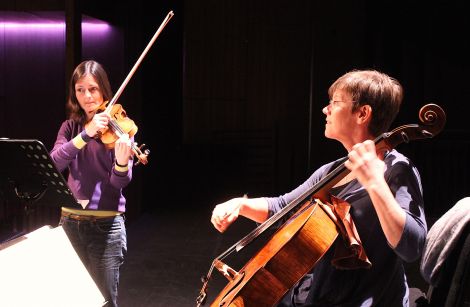Reviews / An excellent evening of classical music
The Scottish Ensemble graced Mareel’s stage once again for the third part of their Shetland Series – Duos for Violin and Cello – on Thursday night, writes Alex Garrick-Wright.
The previous show Quintets was comprised entirely of three long compositions.
Duos for Violin and Cello was a musical anthology of shorter pieces that worked very well.
Violinist Cheryl Crockett and cellist Alison Lawrance wasted no time in getting stuck into Pleyel’s Sonata No. 1, a fast and light piece to get the crowd warmed up. The sound quality was top-notch, with the music flowing freely to every corner of Mareel’s auditorium.
Sonata No. 1 was an excellent opener, moving from a gentle start to an energetic and upbeat end it really got everyone in the mood.
Next up was Russian composer Glière, of whose simply titled 8 Pieces we were to hear just four. Lawrance explained that Glière was heavily influenced by the nationalist style of legendary Russian composer Rimsky-Korsakov, an influence that was extremely apparent.
The movements were incredibly evocative, especially the first, which was effortlessly dark and spooky. Easily the best, this first movement was like the soundtrack to some eerie Russian folktale where a woodcutter gets slowly pursued through a forest by Baba Yaga.
This was followed by a sprightly second movement that sounded very much like a Scottish folk tune in places. A dramatic and rich third movement gave way to a strange little piece, which alternated jarringly between a toe-tapping jig and being serious and sombre.
Lawrance informed the audience that Hungarian composer Béla Bartók used to listen to and collect the folk tunes from people living in remote villages – not ‘the Village People’ as she actually said, before correcting herself, which is a pity because a Hungarian classical composer’s take on In The Navy would have been fantastic.
Become a member of Shetland News
Bartók’s contribution was seven short folk tunes that moved seamlessly into each other – jolly and playful one moment, sad and slow the next. The pieces were all very interesting and enjoyable, and it almost felt too brief. For before long, the audience was whisked onwards.
Norwegian composer Johan Halvorsen’s Passacaglia was a weird one. The end of a Handel harpsichord sonata, written for violin and viola in the style of a Spanish street dance, here adapted to replace the viola with a cello. Crockett and Lawrance described it as “a bit mad”, which was an understatement.
They warned the audience of Passacaglia’s technical difficulty: “We can handle it,” came a cry from the audience. “I hope we can handle it,” they replied.
Handle it they did – a deliriously fast and fiddly bit of playing that certainly sounded like a violin pretending it was a harpsichord. For the first time both artists were able to truly flex their musical muscles as they played unbelievably complicated sections string-burningly fast, and pizzicatoed their fingers to the bone.
Ravel’s Sonata for Violin and Cello (or the last two movements of it anyway) was described as a ‘very clever work’ that’s notorious for its high level of difficulty.
Both two seriously talented musicians naturally made short work of it, wowing the musicians in the audience. The only problem is that, for all its technical skill, Ravel’s Sonata wasn’t actually that enjoyable.
As a demonstration of the skill of the artists it hit the mark, but for the layperson in the audience it seemed to go on too long, and the imaginative delights of Glière seemed very far away. Nevertheless, it earned a well-deserved and long applause.
However, the whole night could be won or lost on the final piece – Ferdinand the Bull by Alan Ridout. Based on the classic children’s book, Ferdinand tells the story of a bull who would rather smell flowers than fight matadors. Ridout’s 1971 adaptation is a classic for violin and (camp, heavily-accented) narration. True to form, Lawrance put down her cello and took up a microphone, and led the audience through this whimsical tale.
The audience were enraptured and tickled by Ferdinand, laughing heartily every time we were reminded that his mother is a cow (with accompanying ‘mooing’ on violin) and warmed at his love of smelling flowers.
For those who remember Ridout’s version from childhood, it was a brilliantly executed exercise in nostalgia – for those who heard it for the first time, it was either a heart-warming and funny story about a silly bull, or an allegory for pacifism and conscientious objection in a post-Great War society (take your pick).
The applause was sustained and raucous, not stopping until both Crockett and Lawrance had instruments in hand once again for an encore – Shostakovich’s suite for The Gadfly.
A relaxing and soft way to round off another excellent evening in the company of the Scottish Ensemble, supported by Inkster Solicitors.
Alex Garrick-Wright
Become a member of Shetland News
Shetland News is asking its many readers to consider paying for membership to get additional features and services: -
- Remove non-local ads;
- Bookmark posts to read later;
- Exclusive curated weekly newsletter;
- Hide membership messages;
- Comments open for discussion.
If you appreciate what we do and feel strongly about impartial local journalism, then please become a member of Shetland News by either making a single payment, or setting up a monthly, quarterly or yearly subscription.






























































